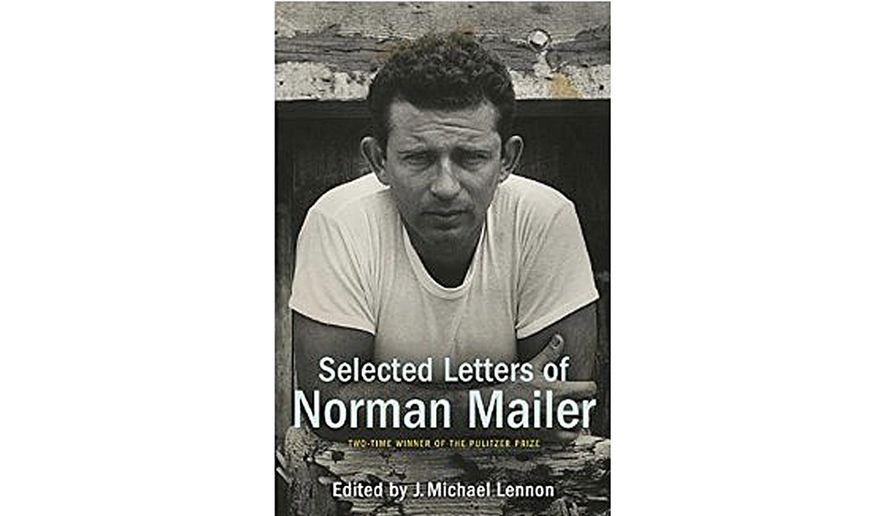OPINION:
Last year, J. Michael Lennon, Norman Mailer’s authorized biographer, brought out “Norman Mailer: A Double Life,” nearly 1,000 pages packed with everything thought or said by or about Mailer, his life, his friends and enemies, his work — a well-written and thoughtful study so comprehensive that it seemed to obviate the need for any further biographical data.
But a year has passed, and Mr. Lennon (also Mailer’s official archivist) is back with a volume, nearly as thick and heavy, of Mailer’s correspondence (and a small sampling, Mr. Lennon tells us, from some 45,000 items), reflecting the thoughts and concerns of the nearly seven decades that Mailer played a role in American literary life — at times major, at others peripheral, but always a presence.
In 1948 Mailer, a veteran, hit the literary scene with “The Naked and the Dead,” the first — and many thought the best — of the World War II novels. There were others. But Mailer was first, his novel critically acclaimed, and from then on the goal was to become America’s foremost man of letters.
That would be a tough slog. It was the golden age of the American novel, and the competition was stiff — from a rising crop of novelists and from established writers such as Hemingway, Faulkner, Steinbeck, who were not only studied in literature courses but also rode regularly at the top of the best-seller lists.
He wrote furiously, giving it his best, but the next two novels — “Barbary Shore” (1951) and “Deer Park” (1955) — received negative reviews.
The failure of “Deer Park” cut deeply. It was, he wrote to John A. Aldridge, “my favorite of the novels.” He had sent a pre-publication copy to Ernest Hemingway, asking for his comments (and no doubt hoping for his blessing). The package came back, unopened, and although Hemingway tried to make up for it later, Mailer was wounded.
As Mr. Lennon points out, Mailer “has more to say about Papa [Hemingway], his life, death and work, than about any other writer.” It may well have been that Hemingway, with his ceremonial drinking, womanizing and macho style, combined with a total dedication to his craft, set the standard for Mailer’s view of what a writer should be.
For a time his disappointments would divert him from his goal of writing great novels, most notably with “Advertisements for Myself” (1959) — as Mr. Lennon describes it, “a genre-conflating work — part confession, part tirade, part visionary testament.”
Mailer seriously returned to the novel in 1965 with “An American Dream.” Again, reviews were disappointing, with the exception of Joan Didion’s, prompting a letter to Bill Buckley: “What a marvelous girl Joan Didion must be who would have ever thought the nicest piece I would read about myself four weeks after publication should come in the National Review.”
Given the limited success of his novels, and given his energy, interests and the rapidly changing times, he and the new journalism, with fictional techniques applied to reporting factual situations, would prove a natural fit.
Among the best of this period was his 1968 nonfiction narrative, “The Armies of the Night: History as a Novel,” which won a Pulitzer and the National Book Award for its dramatization of the 1967 march on the Pentagon. There was “Miami and the Siege of Chicago,” a narrative of the 1968 Nixon-Humphrey conventions, and in 1972 “St. George and the Godfather.” In 1979, “The Executioner’s Song” won a second Pulitzer.
There would be another major attempt at a memorable novel with “Harlot’s Ghost,” (1991), large and complex, centering on the CIA. Again, the reviews were less than positive. (My favorable review in The American Spectator prompted a friendly note.) Nevertheless, the output continued.
The best of this collection concerns writing projects completed, underway or proposed, with special attention to hostile reviews and reviewers, especially those at The New York Times. There are also numerous letters to literary friends and competitors, as well as letters to political figures such as Hillary Rodham Clinton, Henry Kissinger, Fidel Castro. (There’s also a letter to Monica Lewinsky, who probably could be called a political figure.)
His relationship with Bill Buckley, always cordial, provided him an opportunity to define himself politically. In 1962 in Chicago, he and Buckley debated the Cold War, with their speeches reprinted in Playboy, under the headings “A Conservative’s View” and “A Liberal’s View,” prompting this letter to the editor:
“I wish you hadn’t billed the debate as a meeting between a conservative and a liberal. I don’t care if people call me a radical, a rebel, a red, a revolutionary, an outsider, an outlaw, a Bolshevik, an anarchist, a nihilist, or even a left conservative, but please don’t ever call me a liberal.”
All of the above, no doubt, at one time or another. But as Suzanne Fields, who plays a role in the opening pages of “Armies of the Night,” put it, “in his best work he challenged both convention and himself.”
If he never quite succeeded in writing that second memorable novel, he lived it.
• John R. Coyne Jr., a former White House speechwriter, is co-author of “Strictly Right: William F. Buckley Jr. and the American Conservative Movement” (Wiley).




Please read our comment policy before commenting.